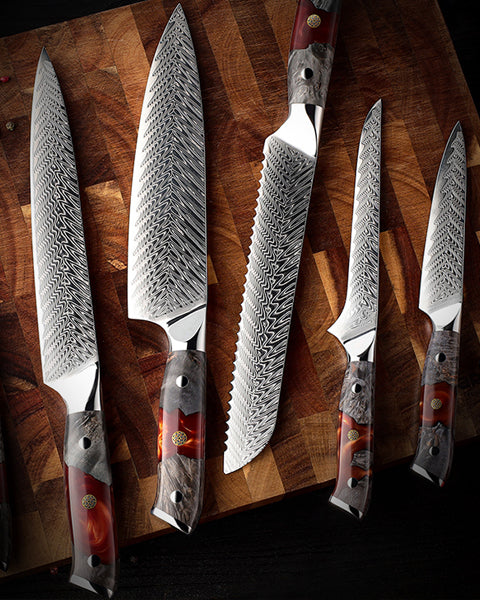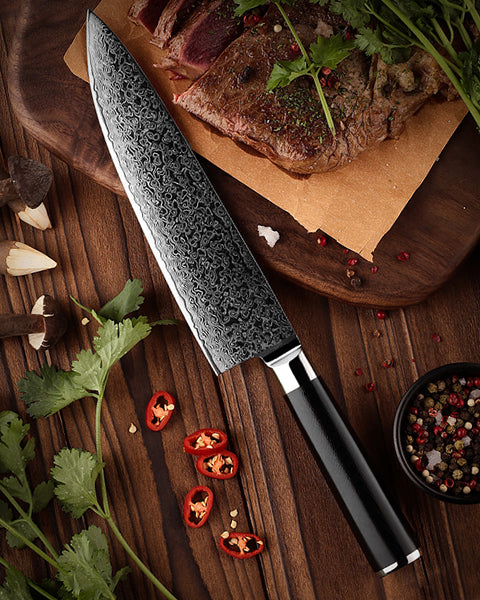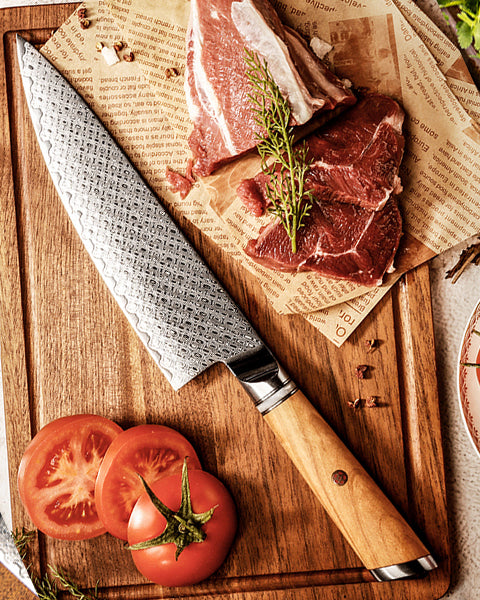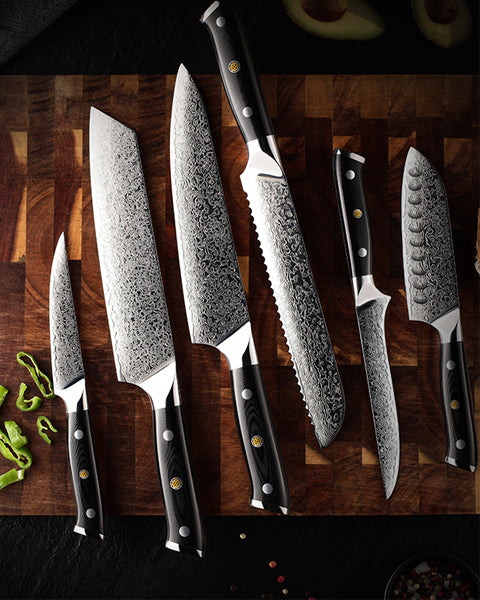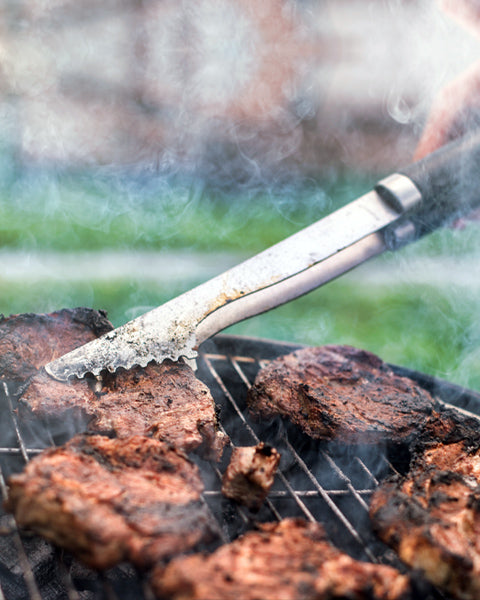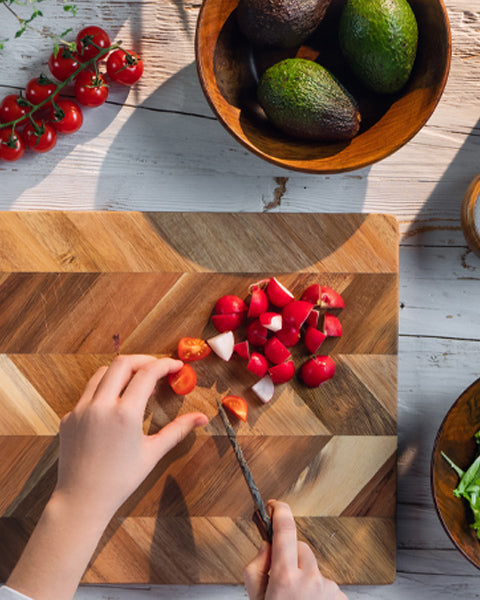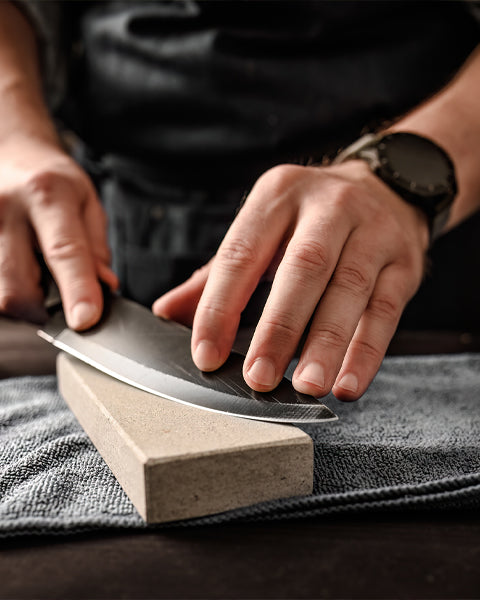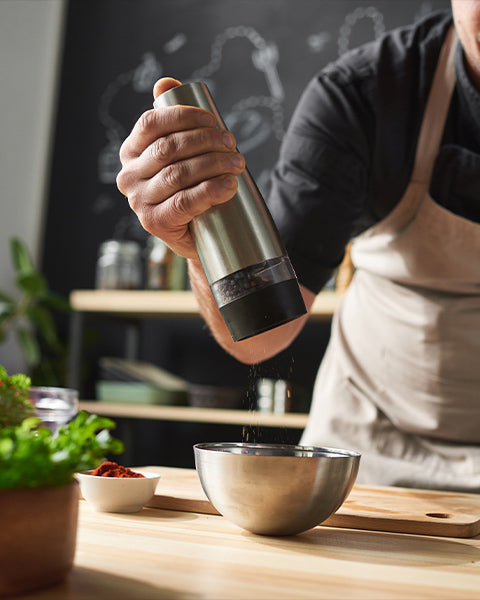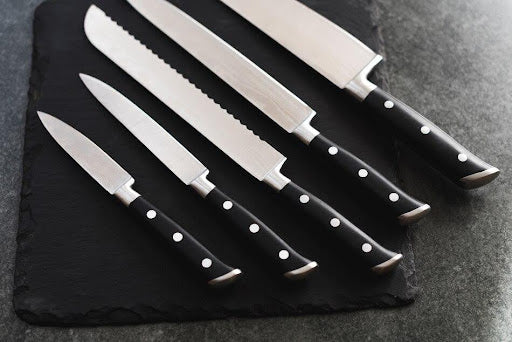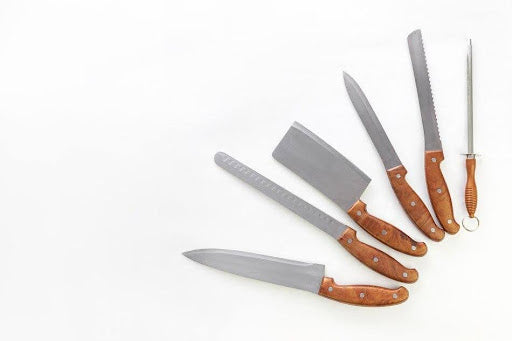Home chefs and food enthusiasts must understand how knife blade material affects performance. Choosing knives for your kitchen affects sharpness, durability, and performance. Choosing between stainless steel, Damascus steel, and other blade materials might be complex. Blade materials' features and attributes may help you choose one that improves your cooking experience.
Knife blade material affects performance. Stainless steel knives are famous for regular kitchen use due to their corrosion resistance and simplicity of maintenance. High-carbon stainless steel knives are great for precise cutting due to their sharpness and edge retention. Chefs and knife lovers love Damascus steel knives for their distinctive patterns and performance. Carbon steel knives provide superior sharpness and cutting accuracy but need more upkeep.
Choosing the appropriate knife blade material is crucial for kitchen success. Blade material affects knife performance whether cutting vegetables slicing meat or preparing delicate items. Knowledge of blade materials is required to choose knives that match your requirements and preferences.
Choplix knows that excellent cookware enhances cooking and makes meals delightful. We provide high quality kitchen knives made of stainless steel and Damascus steel. Our knives offer superior performance durability and accuracy so you can confidently tackle any culinary challenge. Our creativity and artistry make Choplix your trusted kitchen companion helping you create delicious meals every time.
Knife Blade Material Properties
Blade material affects performance and durability. Material qualities affect sharpness, edge retention, toughness, and corrosion resistance. Understanding these features is vital for selecting the best knife and maximizing kitchen performance.
Hardness
Hardness is a knife blade material's ability to resist deformation and preserve shape under pressure. More complex materials provide sharper, longer-lasting edges. Chefs who value sharpness and edge retention choose high-carbon steel for its toughness. Hard blades may be fragile and crack or break under high force.
Toughness
Knife blade toughness is its ability to endure impact and bending without breaking. Hardness provides sharpness, while toughness ensures durability. A durable blade material can survive daily usage without chipping or cracking. Rugged stainless steel is suitable for kitchen knives that must survive repeated usage and damage.
Corrosion Resistance
A knife blade's corrosion resistance is its ability to withstand rust and discoloration from moisture and acidic meals. Non-corrosion-resistant blades may rust or discolor. Kitchen knives constantly exposed to water and acidic chemicals benefit from stainless steel's corrosion resistance. Some materials, like high-carbon steel, need extra care to avoid corrosion.
While picking knives, you must evaluate your demands, tastes, and blade material attributes. A high-carbon steel knife may be optimal for sharpness and edge retention. A stainless steel knife may be better if you need longevity and corrosion resistance. Ceramic knives are sharp and corrosion-resistant, but mishandling may chip or shatter them.
Knife performance and durability depend on blade material. You may select the perfect kitchen knife by studying material characteristics and your demands and preferences. Blade materials may suit sharpness, durability, and corrosion resistance needs. Choplix's high-quality kitchen knives let you choose the blade material that best suits your cooking style.
Common Blade Materials
Stainless Steel:
Stainless steel is used in kitchen knives because of its flexibility, durability, and simplicity of maintenance. It's popular for ordinary kitchen use because it resists rust, corrosion, and discoloration. Stainless steel knives need less care than other blade materials because they last longer and stay sharp.
The cost of stainless steel knives is a significant benefit. Many people can afford them because stainless steel knives are affordable without sacrificing quality or performance for household cooks or professional chefs.
Stainless steel knives are durable affordable and flexible. They cut vegetables meat and fish well. Stainless steel toughness makes it ideal for complicated food preparation as it cuts and slices precisely.
However stainless steel knives have limits. Even though they resist rust and corrosion they may wear out with time especially with heavy usage. In addition stainless steel knives may need more regular sharpening than knives from other materials.
High Carbon Stainless Steel
High carbon stainless steel is a premium blade material that blends carbon steel and stainless steel. Professional chefs and serious home cooks choose this material because it retains sharpness and edge better than stainless steel. Sharpness is a significant benefit of high carbon stainless steel knives.
The steel high carbon concentration allows for a sharper edge during honing creating razor sharp knives that can cut and slice precisely. High carbon stainless steel knives have exceptional edge retention lasting longer between sharpenings. In busy kitchens regular sharpening may not be possible.
Other benefits of high carbon stainless steel knives are rust and corrosion resistance. Chromium and other alloying components give high carbon stainless steel knives the same sharpness and edge retention as carbon steel knives but without rust.
Damascus Steel
Damascus steel is praised for its strength durability and unusual beauty. Its wavy design is generated by continuously folding and striking steel during forging. This technique gives Damascus steel its characteristic appearance and aligns its grain structure creating a robust and tough blade.
Damascus steel main advantages are sharpness and edge retention. Knives made of Damascus steel are chosen for accurate cutting because they keep their sharpness after repeated usage. Damascus Steel unusual patterning makes each blade unique and appealing to collectors and fans.
Damascus steel knives need specific care to maintain their look and effectiveness. To avoid rust and corrosion clean and dry them after use and oil them occasionally. A Damascus steel knife may be a family treasure with appropriate maintenance.
Carbon Steel
Traditional carbon steel blades are prized for their sharpness and edge retention. Chefs and culinary fans love them for their cutting performance. Carbon steel knives' razor sharp edges make slicing dicing and chopping easy and accurate. Carbon steel retains its sharpness longer than stainless steel. Steel increased carbon content provides for more significant blade hardening.
Carbon steel knives need additional care to avoid rust and corrosion. To keep the knife shiny and prevent oxidation dry it quickly after cleaning and oil it periodically. Despite the upkeep many cooks choose carbon steel knives for their greater cutting performance and the pleasure of using well made equipment. With appropriate maintenance a carbon steel knife may be a lifelong kitchen partner.
Impact On Sharpness And Edge Retention
Knife sharpness and edge retention depend on blade material. Material qualities determine how effectively a knife keeps its edge. Understanding these distinctions will help you buy the proper knife and maximize its cooking performance.
Kitchen knives are often made of stainless steel. It is famous for daily usage because of its toughness and corrosion resistance. Based on the alloy stainless steel blades may vary in sharpness and edge retention. Carbon content gives high carbon stainless steel superior edge retention and sharpness compared to standard stainless steel.
Carbon steel which sharpens well is another preferred blade material. Carbon steel knives are perfect for precise cutting because they keep razor sharpness. Carbon steel needs more care than stainless steel because it rusts and corrodes more easily.
Damascus steel is another sharp and durable knife blade material. Layering multiple steels creates a blade with a unique pattern and excellent performance. Chefs and collectors love Damascus steel knives for their beauty and performance.
Consider your use while picking a knife based on sharpness and edge retention. You may choose a high-carbon stainless steel or Damascus steel knife that stays sharp without sharpening. If sharpness is crucial and you are okay with the additional upkeep, a carbon steel knife may be for you.
Blade material affects knife sharpness and edge retention. Knowing the qualities of various materials lets you pick a knife that meets your requirements and works effectively in the kitchen. Whether you choose stainless steel, carbon steel, or Damascus steel, a blade material can improve your cooking experience.
Durability And Maintenance
Kitchen knives must be durable and upkeepable. Blade material and structure influence a knife's longevity, while maintenance keeps it in top shape for long-term usage. Understanding these factors may help you pick and maintain a knife.
Knife Blade Material And Durability
Knife durability depends on blade material. Stainless steel knives resist rust and corrosion, making them durable. Higher carbon content makes high-carbon stainless steel knives more durable. With their unique designs, Damascus steel knives are durable but need maintenance to look good. Carbon steel knives, although sharp, corrode easily and need constant maintenance.
Construction And Durability
Along with blade material, knife structure impacts durability. Full-tang knives, where the blade extends through the handle, offer durability and balance. This design makes the knife more robust and less likely to shatter or bend. The stupid junction between the blade and the manager gives knives weight and balance, making them more durable.
Maintenance Tips For Longevity
- Handwash your knives with warm, soapy water immediately after use.
- Dry your knives thoroughly to prevent moisture buildup and rust.
- Shop your knives in a knife block or sheath to protect the blades.
- Regularly hone your knives with an honing steel to maintain sharpness.
- Avoid cutting on challenging surfaces like glass or stone, as this can dull the blade.
- Use a cutting board to protect the blade and prevent damage.
Choosing The Right Knife For Longevity
When buying a durable knife, consider blade material, artistry, and usage. Stainless and high-carbon stainless steel knives are long-lasting, and full-tang knives are more robust. Choosing the right knives and keeping them correctly may keep them in good shape for years.
Our Choplix website sells durable kitchen knives. Due to their durability, elegance, and usefulness, Choplix knives are ideal for novice and expert chefs. The lifetime warranty ensures that our knives will operate well for years.
Knife Performance In Specific Tasks
The blade material of kitchen knives affects their performance in various jobs. Different blade materials perform differently in slicing, chopping, and other culinary activities. How each blade material performs in certain activities is crucial for picking the best knife for your kitchen.
Stainless Steel Knives:
Stainless steel knives are popular in kitchens due to their durability, corrosion resistance, and simplicity of maintenance. They slice and chop well in many jobs. Their sharpness and edge retention allow them to precisely cut meats, vegetables, and fruits. However, stainless steel is softer, so these knives may need more honing to keep their edge.
High Carbon Stainless Steel Knives:
High carbon stainless steel knives are corrosion resistant and provide exceptional sharpness and edge retention. They also keep their edges sharper for longer making them ideal for slicing and chopping. These knives are suitable for juicing vegetables and thinly sliced meats.
Damascus Steel Knives
Damascus steel knives are admired for their beauty and performance. The steel distinctive layering pattern enhances the knife looks and cutting capabilities. Damascus steel knives are accurate and precise for slicing delicate materials or making complicated cuts. Their sharpness and edge retention make them perfect for precise work.
Carbon Steel Knives
Carbon steel knives provide excellent sharpness and edge retention. They stay razor sharp after frequent use making them ideal for slicing. Slicing tomatoes or filleting fish requires accuracy and control so these knives are perfect. However they need extensive maintenance to avoid rust and corrosion making them unsuitable for low maintenance cooks.
Choosing Knives Based On Performance
Blade material performance is crucial when picking knives for certain jobs. Damascus steel or high carbon stainless steel knives are ideal for precise jobs like chopping vegetables or filleting fish. Stainless steel knives work well for cutting vegetables and meats. Users choose blade materials based on their tastes and the knife duties.
Kitchen knives' blade composition affects their performance. Stainless steel high carbon stainless steel Damascus steel and carbon steel perform differently in slicing chopping and other culinary chores. By learning the pros and cons of each blade material users may choose knives that suit their requirements and tastes improving their kitchen experience.
Conclusion
Kitchen knives' performance depends on blade material. Sharpness edge retention longevity and maintenance vary by blade material. Stainless steel is precious for its toughness and rust resistance. High carbon stainless steel has improved sharpness and edge retention making it perfect for precise cutting. Knife lovers love Damascus Steel for its gorgeous patterns and performance. Chefs favor carbon steel for its sharpness but higher upkeep.
When picking a knife examine your duties and choose a blade material that matches them. High carbon stainless steel or Damascus steel may be optimal for sharpness and edge retention. Stainless steel and high carbon stainless steel are great for durability and little maintenance. Understanding how blade material affects knife performance is essential to choosing the proper knife for your kitchen.
Knife performance depends on blade material. Your knife will perform effectively and endure for years by picking the proper blade material. Choosing the appropriate knife is crucial for chefs and home cooks alike. With so many blade materials there a knife for every taste and budget. So study and select intelligently to get a knife that makes cooking fun and easy.

